
A significant historical event that changed the destiny of entire countries and helped to create the modern world was the American Revolutionary War. The thirteen British colonies in North America fought for their independence against the powerful British Empire over the course of several years in this epic narrative of battle and strategy. In this blog post, I’ll delve into the specifics of this important struggle, looking at its causes, major players, crucial engagements, and long-lasting effects.
Prelude to Revolution
British Colonization and Early Colonial Life
The British Empire possessed colonies on what is now the eastern coast of the United States before the American Revolutionary War. These colonies were primarily founded as economic ventures, aiming to exploit the abundant natural resources and establish lucrative trade networks. The colonies flourished, with settlers building prosperous communities and developing unique social, religious, and political identities.
Conflicts and Unhappiness in the Colonies
The colonist’s animosity toward the British Empire intensified over time. Although the colonies profited from British trade and protection, they felt increasingly constrained by a number of British government policies. Prohibitive taxes, such as the Sugar Act and the Townshend Acts, burdened the colonists, sparking resentment and frustration. Additionally, the lack of colonial representation in the British Parliament further fueled discontent and a growing desire for self-governance.
Road to Rebellion
The Stamp Act and Colonial Resistance
The passing of the Stamp Act in 1765 was a turning point that ignited widespread resistance among the colonists. This legislation required the use of stamps on various legal documents and printed materials, essentially levying a tax on everyday necessities. Its implications were far-reaching, as the colonists interpreted the act as an infringement on their rights and a violation of their property.
The Boston Massacre and Tea Party
Tensions escalated further in the environment of Boston, Massachusetts, where anti-British sentiment was particularly strong. The Boston Massacre of 1770 further stoked the flames of rebellion. British soldiers fired upon a mob of colonists, resulting in the tragic loss of five lives. This event became a symbol of British oppression and increased the resolve of the colonists to fight for their rights.
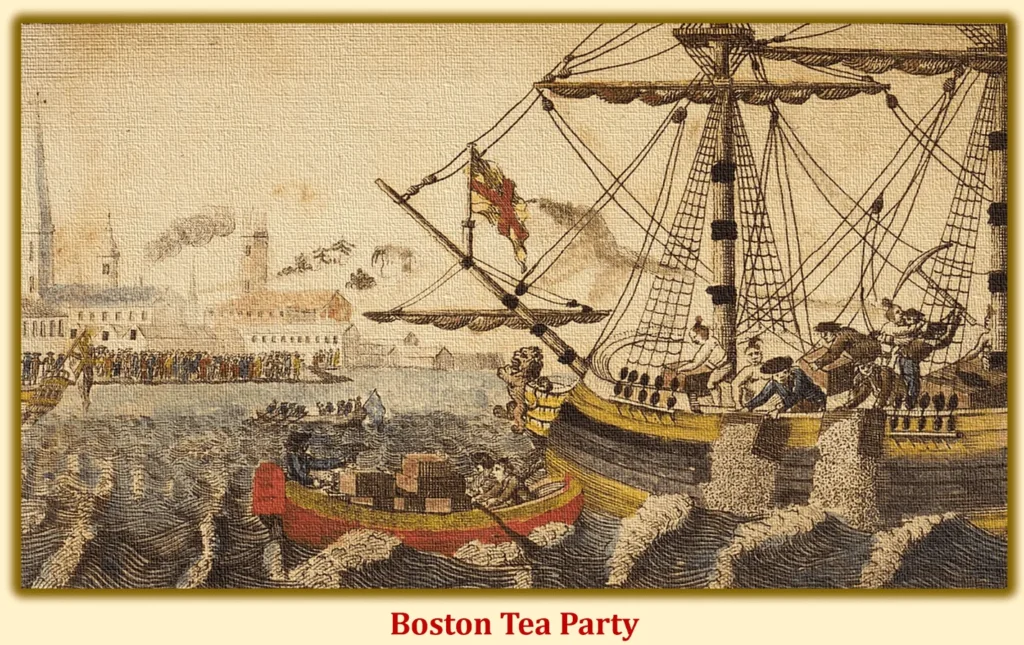
The Boston Tea Party of 1773 represented an act of defiance against British rule. In protest of the Tea Act, which granted the British East India Company a monopoly on tea trade, a group of colonists disguised as Native Americans boarded three British ships that were docked at the Boston Harbor, and they dumped the all the tea cargo into the water. This audacious act of resistance further deepened the divide between the colonists and the British government.
The Birth of a Nation: From Congress to Conflict
The First Continental Congress
In response to intensifying tensions and grievances, representatives from twelve colonies convened in Philadelphia in 1774 for the First Continental Congress. This historic assembly marked a crucial step towards colonial unity. Delegates deliberated on colonists’ rights, drafted petitions to the British King, and adopted measures to organize and prepare for potential conflict.
Lexington and Concord Battles
The first shots of the American Revolutionary War were fired on April 19, 1775, near Lexington, Massachusetts, in what became known as the “Shot Heard ‘Round the World.” British soldiers clashed with a local militia, igniting armed resistance. This skirmish was followed by the Battle of Concord, where colonists effectively repelled British troops and began asserting their military strength.
Fateful Decisions: Battle for Independence
Second Continental Congress
The Second Continental Congress met in Philadelphia in 1775 despite ongoing hostilities. This Congress was crucial to the outcome of the war because it deliberated on issues of governance and finally made the historic choice to secede from Great Britain.

The Struggle for Control: The Revolutionary War Unfolds

The Revolutionary War unfolded with a series of pivotal events and battles. In 1775, during the Siege of Boston, George Washington was in charge, and he managed to encircle and cut off British soldiers in Boston. This pressured the British to leave. Before adding some victories in their bag, the colonists had some early defeats like at the Battle of Long Island. While the victory at the Battle of Trenton and many more, boosted their morale.

The Battle of Saratoga in 1777 was the crucial phases in the conflict. It is also referred as the Battle of Freeman’s Farm. General Horatio Gate’s American soldiers defeated the British in a crucial conflict. This win not only made the Americans feel really good but also convinced the French to become friends with the United States. They helped the US with both soldiers and money, which was super important. Other countries joining in was a big deal and changed the war’s outcome a lot.
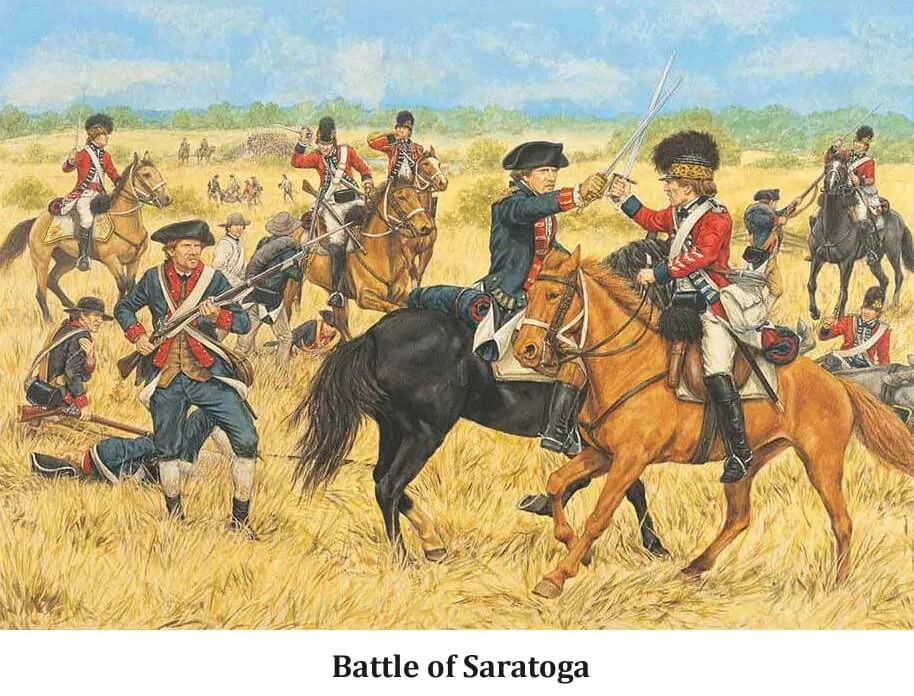
Soldiers and Leaders: Heroic Tales Amidst Peril
George Washington: Commander-in-Chief
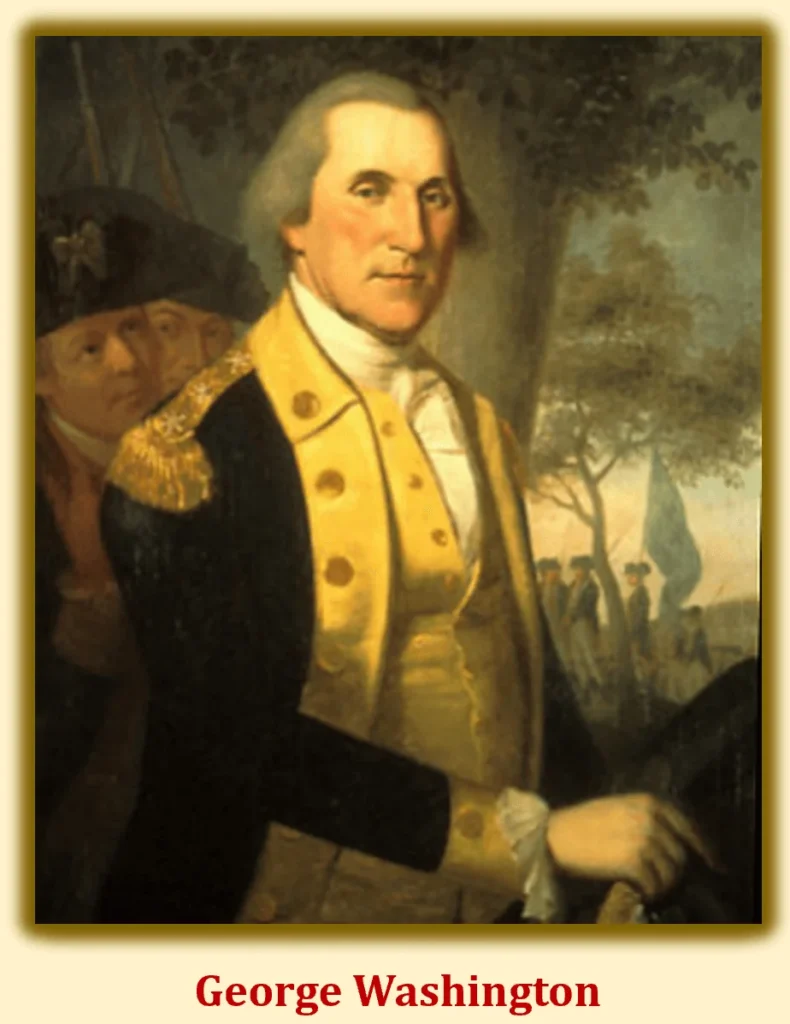
George Washington had an extremely significant part to perform during the American Revolutionary War. He was in head of the Continental Army, and the eventual victory of the colonies was greatly influenced by his visionary leadership and sharp mind. He faced a lot of tough challenges during the war, like not having enough supplies, soldiers leaving, and having to fight against a stronger army.
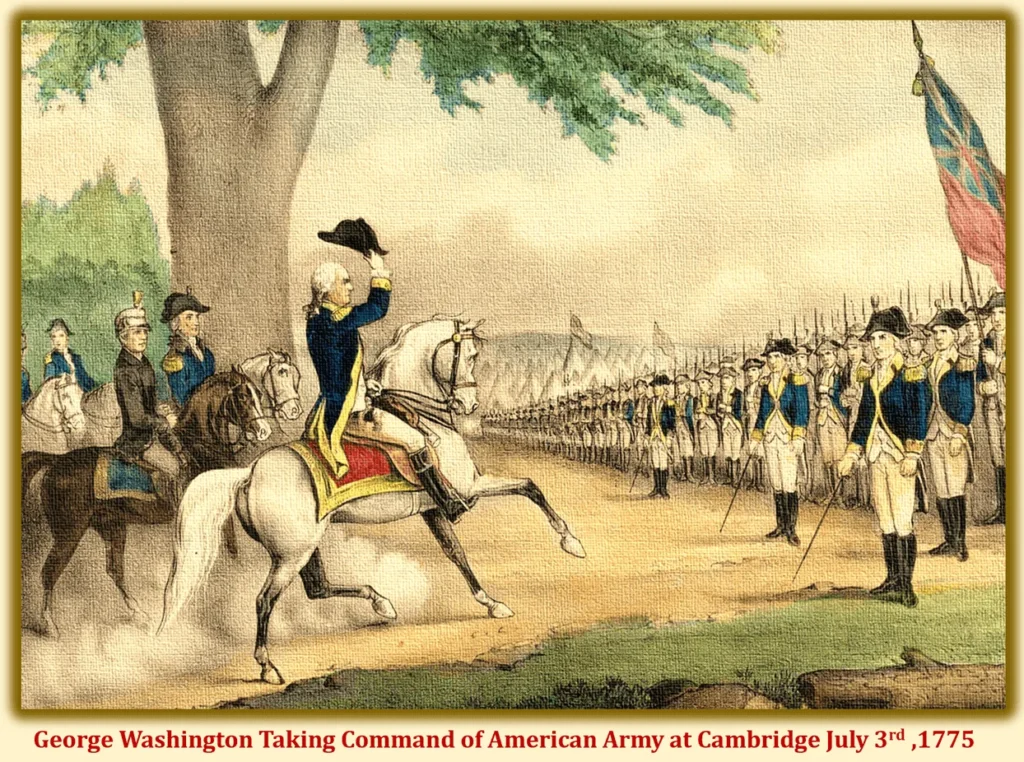
Marquis de Lafayette: A Foreign Champion
One notable figure who contributed to the American cause was Marquis de Lafayette, a French nobleman who volunteered to fight alongside the colonists. Lafayette’s passion for liberty and his military expertise proved invaluable to the American forces. He played a vital role in various battles, including the decisive victory at Yorktown, where his leadership helped secure American independence.

The War Intensifies: From Valley Forge to Yorktown
The Winter at Valley Forge
The winter of 1777-1778 at Valley Forge marked a significant trial for the Continental Army. Amidst brutal weather conditions and scarce provisions, the soldiers faced immense hardships. However, this challenging period also fostered a sense of unity and determination among the troops. General Friedrich Wilhelm von Steuben, a Prussian military officer, arrived at Valley Forge, implementing rigorous training and discipline that significantly improved the Continental Army’s readiness.

The French Alliance and Crucial Victories
The work of American diplomats resulted in an alliance pact with the Kingdom of France in 1778. This alliance posed a significant challenge to the British Empire by providing crucial military and financial backing to the colonists. The turning point in favor of the colonists was highlighted by key successes like the Battle of Yorktown in 1781, where combined American and French troops surrounded and forced the surrender of a sizable British army under Lord Cornwallis.

Towards Peace and the Birth of a Nation
Negotiating Independence: Treaty of Paris 1783
After long peace talks between the United States and Great Britain, the Treaty of Paris was concluded in 1783. This agreement defined the terms and circumstances of peace while also recognizing the United States’ independence. The former colonies were granted sovereignty, establishing the United States as a new nation on the global stage.
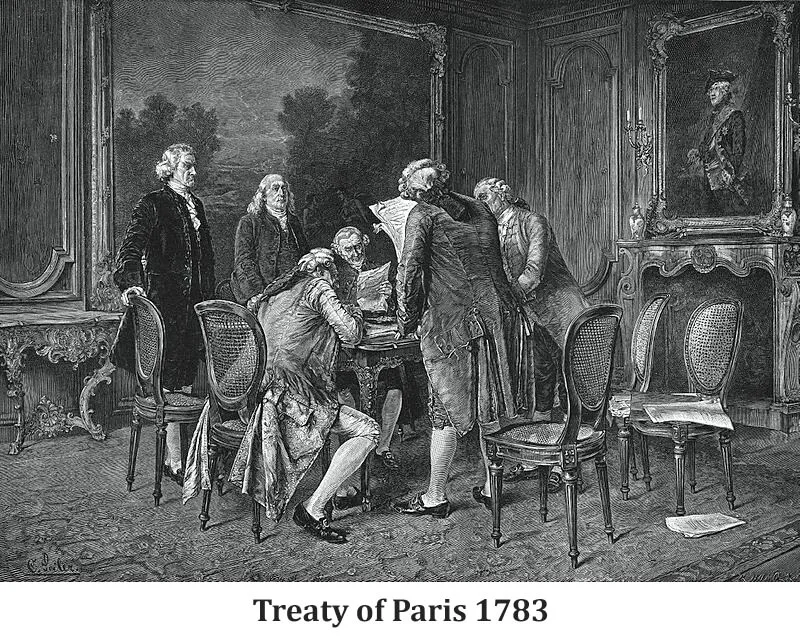
Emergence of a New Nation
A new nation came into existence as a result of the American Revolutionary War. The first collection of legislation regulating the United States. It came to be known as the Articles of Confederation and came into effect in 1781. As it was the first set of rules to govern a country it too had few shortcomings. It also had many problems as it was the first set of guidelines. So, people made a better plan called the United States Constitution. This new plan was stronger and better for running the country. The Revolutionary War started the ideas and rules that still guide the United States today.
Legacy and Impact of the American Revolutionary War
Inspiring Revolutions Worldwide
The American Revolutionary War reverberated far beyond the borders of the young United States. Its success against a powerful empire inspired numerous revolutions worldwide, as oppressed peoples sought to secure their own freedoms and rights. The American Revolutionary war became a symbol of hope and the embodiment of the fight for liberty.
The Enduring Ideals of the Founding Fathers
The important beliefs and values of the founding fathers during the American Revolutionary War still really matter in the United States today. Things like everyone having their own rights, following rules, and being part of the community are still really important. The impact of the Revolutionary War is like a strong mark on the country’s character, and it helps the country keep working towards being even better.
Lessons Learned and Modern Reflections
When we think about the American Revolutionary War, we can learn important things for today and tomorrow. It shows us how sticking together, staying determined, and believing in important ideas are really crucial. The war reminds us that making things better can be hard and needs a lot of effort, but the freedom and good things that come from it are worth the effort.
Summary
Recap of the American Revolutionary War
The thirteen British colonies battled the British Empire for independence during the American Revolutionary War, which lasted for several years. Protests, boycotts, and acts of defiance laid the way for the uprising, which began with tensions and complaints among the colonies. The birth of a nation occurred as the colonists united in Congress, and armed conflict became inevitable. Fateful decisions and key battles shaped the course of the war, leading to the ultimate victory of the colonists.
Key Figures, Battles, and Events
George Washington, Horatio Gates, and Marquis de Lafayette were those leaders in American history who have played an important part in the great American Revolutionary War. This revolutionary war like many others comprised of several events which became the turning point in the history. It included conflicts such as Lexington and Concord, Saratoga, and Yorktown. The Treaty of Paris was signed in 1783, decisively establishing American freedom.
The Meaning and Impact of the War on American History
Ongoing effects of the American Revolutionary War can be seen in American history. It established American sovereignty, sparked revolutions around the world, and molded the country’s enduring beliefs. American society today still bears the reverberations of the Revolution.
Frequently Asked Questions (FAQs)
What sparked the American Revolutionary War?
The American Revolutionary War broke out because the British imposed severe regulations and hefty taxes on the American colonies while denying them any political influence over the British administration.
How did the colonial uprisings escalate into war?
The colonies went from protests to war because of violent actions by the British army, like the Boston Massacre. This made the colonists really mad, and they started fighting back.
Who were the important leaders of the America’s Revolutionary war?
George Washington, Marquis de Lafayette, and Horatio Gates were all significant figures who led the great Revolutionary War of America.
What were the major engagements that altered the direction of the conflict?
The most crucial engagements that significantly affected how the war played out were Lexington and Concord, Saratoga, and Yorktown.
How did France and other nations contribute to the war effort?
France and other countries helped the American colonies a lot. They sent soldiers and became friends with the colonies, which made a huge difference in the colonists winning.
How did the war lead to making a new country?
The Revolutionary War was the founding stone in the creation of the United States after attaining independence from Great Britain. Its foundations included the notions of justice and democratic governance.
Which impacts of the Revolutionary War lingered for a long time?
The Revolutionary War inspired other countries to have their own revolutions. It also influenced how modern democracies are formed, and it still reminds the world about freedom and people’s rights.
